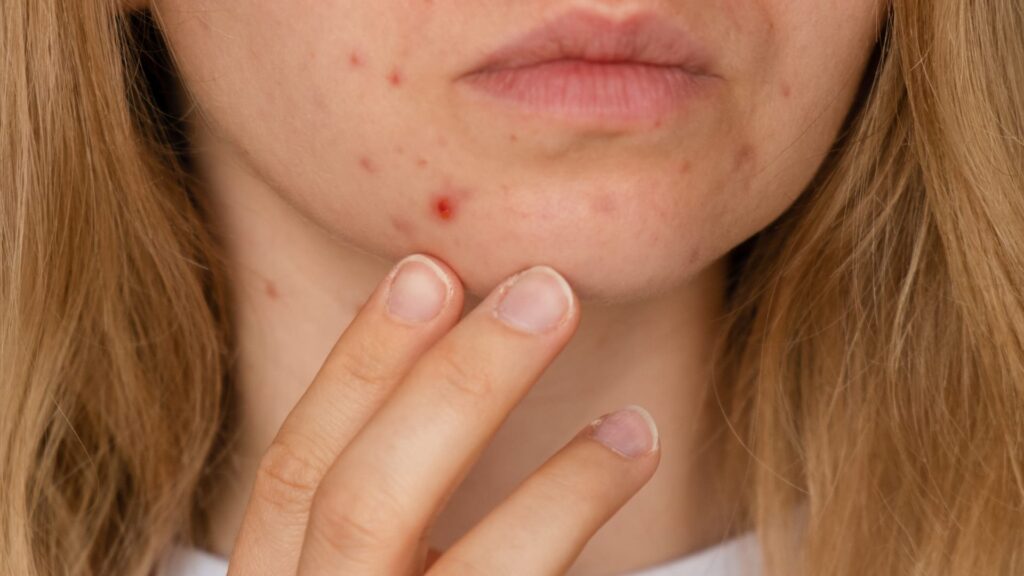- June 5, 2024
- 0
- Uncategorized
Holistic Approaches to Managing Skin Acne: Precautions and Lifestyle Changes for Clearer Skin
Acne is a common skin condition that affects millions of people worldwide, often leading to physical discomfort and emotional distress. While various treatments are available, a holistic approach that combines medical interventions with lifestyle changes and preventive measures can be particularly effective in managing and preventing acne. Understanding the underlying causes and incorporating comprehensive strategies can help achieve clearer, healthier.

One of the primary factors contributing to acne is the overproduction of sebum, an oily substance produced by sebaceous glands. This, combined with dead skin cells and bacteria, can clog pores and lead to inflammation. A holistic approach begins with maintaining a proper skincare routine. Using gentle, non-comedogenic cleansers twice daily can help remove excess oil and impurities without irritating the skin. Additionally, incorporating products with ingredients like salicylic acid or benzoyl peroxide can help keep pores clear and reduce bacterial growth.
Diet plays a crucial role in skin health, and making mindful dietary choices can significantly impact acne management. Foods high in refined sugars and dairy products have been linked to increased acne breakouts. Instead, opting for a balanced diet rich in fruits, vegetables, lean proteins, and whole grains can promote overall skin health. Omega-3 fatty acids, found in fish and flaxseeds, have anti-inflammatory properties that can help reduce acne severity. Staying hydrated by drinking plenty of water also helps maintain skin moisture and flush out toxins.
Stress is another major factor that can exacerbate acne. The body’s response to stress can trigger hormonal fluctuations, leading to increased sebum production. Incorporating stress-reducing practices such as yoga, meditation, or regular exercise can help manage stress levels and improve skin conditions. Ensuring adequate sleep is equally important, as poor sleep can negatively impact health by disrupting the body’s natural repair processes.
Environmental factors, including pollution and exposure to harsh weather conditions, can also contribute to acne. Protecting the skin from these external aggressors is essential. Using a broad-spectrum sunscreen with at least SPF 30 can shield the skin from harmful UV rays, which can worsen acne and lead to hyperpigmentation. Additionally, avoiding excessive touching of the face and ensuring that items like phone screens and pillowcases are kept clean can prevent the transfer of bacteria and oil to the skin.
Incorporating natural remedies can complement traditional acne treatments. Tea tree oil, known for its antimicrobial properties, can be applied topically to reduce inflammation and fight acne-causing bacteria. Aloe vera gel is another natural option that can soothe irritated and promote healing. However, it’s important to perform a patch test before using any new product to avoid potential allergic reactions.

Regular dermatological consultations are essential for managing acne effectively. A dermatologist can provide personalized treatment plans that may include topical or oral medications, chemical peels, or laser therapy. These treatments, when combined with holistic lifestyle changes, can lead to more effective and lasting results. It’s also crucial to follow the prescribed treatment regimen consistently and avoid over-the-counter products that may not be suitable for your skin type.
Managing acne requires a multifaceted approach that addresses both internal and external factors. By adopting a holistic strategy that includes proper skincare, a balanced diet, stress management, environmental precautions, and natural remedies, individuals can achieve clearer and healthier. Consistent efforts and a proactive mindset towards health can lead to significant improvements and boost overall well-being